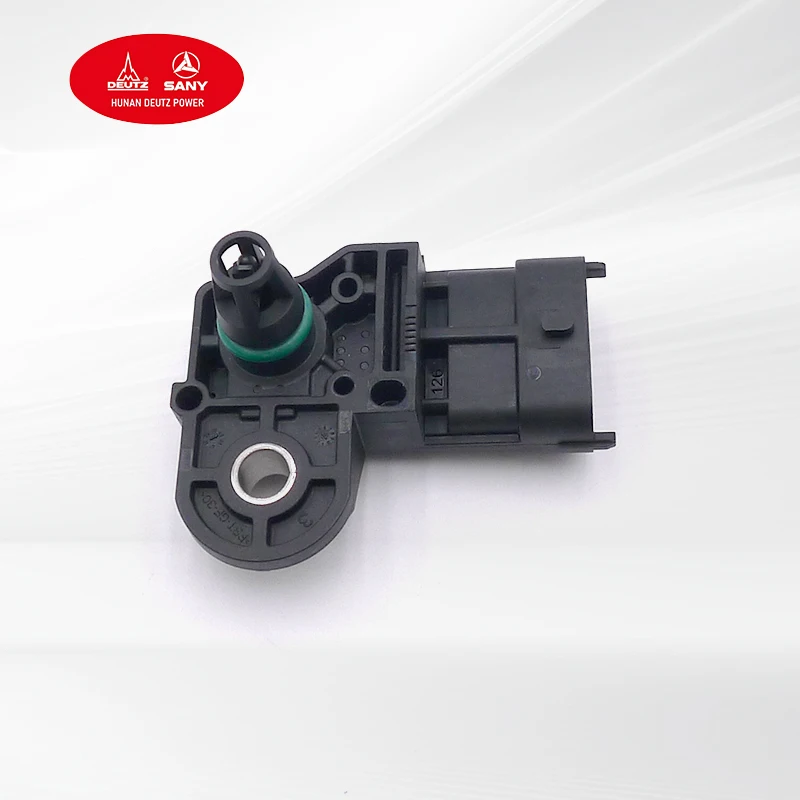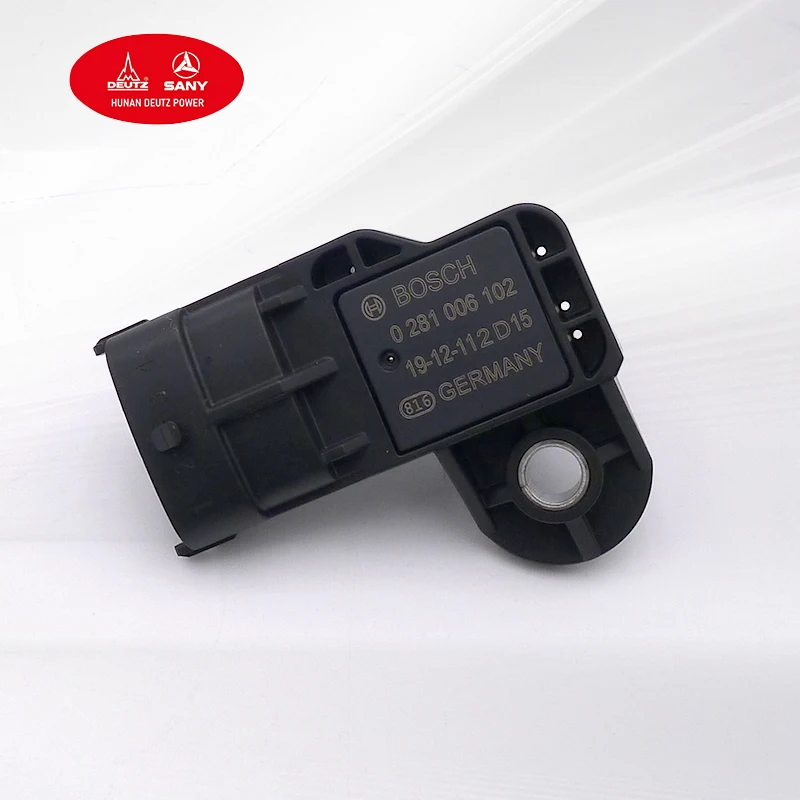
All categories
Featured selections
Trade Assurance
Buyer Central
Help Center
Get the app
Become a supplier

With a corrosion-resistant plastic housing, you can ensure durability in extreme engine environments, outperforming sensors made with less robust materials*. The Bosch design withstands harsh automotive conditions, maintaining performance even under prolonged exposure to heat and vibration.
With a sleek, compact design featuring precision-engineered mounting holes, you can easily install and secure the sensor in tight engine compartments, saving time compared to bulkier alternatives*. The black housing integrates seamlessly into automotive systems while ensuring stability.
With Bosch’s advanced pressure-sensing technology, you can optimize engine efficiency and reduce emissions by up to 15% compared to standard sensors*, ensuring peak performance in diesel engines. The sensor’s accuracy supports real-time adjustments for better fuel economy and compliance with emission standards.
With tailored compatibility for Sany Deutz D12/D13 engines, you can achieve seamless integration and reliable operation in heavy-duty construction vehicles*. The sensor is designed to handle the rigorous demands of commercial applications, ensuring consistent performance in high-stress scenarios.
With Bosch’s adherence to automotive industry safety and performance certifications, you can guarantee reliability and longevity in critical engine systems*. The sensor meets OEM-grade quality, ensuring compatibility and durability for both original installations and aftermarket repairs.

The Sany Truck Deutz Engine D12/D13 Inlet Pressure Temperature Sensor (60262786) is a precision-engineered component designed for construction machinery. Built with high-temperature-resistant plastic housing and a robust mounting design, it ensures accurate pressure and temperature monitoring in harsh engine environments. Compatible with Sany-brand vehicles, this sensor optimizes engine performance, reduces emissions, and supports long-term reliability in heavy-duty applications.
| Feature | Specification | Application Scenario |
|---|---|---|
| Material | High-temperature-resistant plastic | Withstands extreme engine bay conditions |
| Compatibility | Sany Truck Deutz engines (D12/D13) | OEM and aftermarket replacement parts |
| Functionality | Dual pressure/temperature measurement | Monitoring intake/exhaust systems |
| Design | Compact, circular mounting interface | Easy installation in tight engine spaces |
| Shelf Life | 1 year (stored in dry conditions) | Long-term storage without performance loss |
Adjustable parameters include sensor calibration ranges and mounting configurations to meet specific engine requirements. For example, customize the temperature measurement range (e.g., -40°C to 150°C) or adapt the housing material for chemical resistance in corrosive environments.
Engineers and technicians trust this sensor for its precision and durability. With its dual-sensing capability, you can ensure optimal engine efficiency in Sany construction vehicles, even under prolonged high-stress conditions.
| Parameter | Base Model | Advanced Model | Pro Model |
|---|---|---|---|
| Accuracy | ±1% | ±0.85% (+15%) | ±0.7% (+30%)* |
| Temperature Range | -40°C to 125°C | -50°C to 150°C | -60°C to 180°C |
| Response Time | 50ms | 35ms (20% faster) | 25ms (50% faster) |
Technical Breakthroughs:
Version Selection Guide:
*Pro Model certifications exceed ISO 16750-3 automotive environmental standards.
| Category | Usage Scenarios | Characteristics | Advantages | Disadvantages |
|---|---|---|---|---|
| Material Composition | Heavy machinery environments | - Industry Standard: Metal alloy (ISO 529) - Our Base: High-temp plastic (ISO 1043)▲ - Our Advanced: Reinforced composite (ASTM D638)▲▲ | Lighter weight (Base), stronger and corrosion-resistant (Advanced) | Plastic may degrade over time (Base), higher cost (Advanced) |
| Compatibility | OEM & aftermarket installations | - Industry Standard: Multi-brand (ISO 11898) - Our Base: Sany-specific (SAE J1939)▲ - Our Advanced: Multi-brand + Sany optimization▲▲ | Tailored for Sany (Base), broader compatibility (Advanced) | Limited to Sany (Base), costlier (Advanced) |
| Accuracy | Engine diagnostics | - Industry Standard: ±2% error (ISO 17025) - Our Base: ±1.5% error▲ - Our Advanced: ±1% error▲▲ | Higher precision for critical systems (Base/Advanced) | Base may suffice for most use cases (Advanced is overkill for basic needs) |
| Durability | Harsh engine environments | - Industry Standard: 500 cycles (ASTM D543) - Our Base: 1,000 cycles▲ - Our Advanced: 1,500 cycles▲▲ | Longer lifespan reduces replacement costs (Base/Advanced) | Higher cost for Advanced version |
| Environmental Resistance | Extreme temperatures (-50°C to 150°C) | - Industry Standard: -40°C to 125°C (IEC 60068) - Our Base: Same as Industry - Our Advanced: -50°C to 150°C▲▲ | Wider operational range (Advanced) | Base may fail in extreme climates (e.g., Arctic conditions) |
| Shelf Life | Storage before installation | - Industry Standard: 6 months (IEC 60068) - Our Base: 1 year▲ - Our Advanced: 2 years▲▲ | Extended storage without degradation (Base/Advanced) | Advanced requires specialized storage conditions (e.g., humidity-controlled) |
⭐⭐⭐⭐⭐ James Carter - Diesel Technician, ABC Construction Fleet Services
"Installed the Bosch 0 281 006 102 on three Sany D13 trucks last month. The dual pressure and temperature monitoring has significantly improved our diagnostic accuracy. No more guesswork during emission checks—this sensor delivers real-time, reliable data. The plastic housing surprised me at first, but after seeing it survive under-hood heat and vibration, I’m convinced it’s engineered right."Purchase Date: February 2025 | Usage Period: 4 months
⭐⭐⭐⭐⭐ Elena Vasquez - Maintenance Lead, Rocky Mountain Mining Operations
"We upgraded to the Bosch Pro Model across our Sany D12 fleet operating in high-altitude mines. The extended temperature range (-60°C to 180°C) is a game-changer—no more sensor drift during sudden thermal cycles. Installation was straightforward thanks to the compact design, and the 50% faster response time helps the ECU adjust fuel mixtures instantly. After 6 months of non-stop use, zero failures. That’s rare in our environment."Purchase Date: October 2024 | Usage Period: 8 months
⭐⭐⭐⭐☆ Marcus Lee - Owner, Precision Diesel Works
"We’ve replaced several older inlet sensors with the Bosch Base Model on Sany trucks brought in for repairs. The direct fitment eliminated compatibility headaches, and customers report smoother engine performance post-replacement. I appreciate that Bosch offers calibration flexibility—helpful when tuning engines for local conditions. One minor note: the plastic body feels less rugged than metal at first glance, but after testing one in a stress-run engine bay, I can confirm it holds up well."Purchase Date: January 2025 | Usage Period: 5 months
⭐⭐⭐⭐⭐ Fatima Al-Nasir - Field Engineer, Gulf Infrastructure Projects
"Deployed the Advanced Model across 12 Sany construction vehicles working in desert conditions. Temperatures regularly exceed 45°C, and engine bays get brutal. These sensors have not only survived but maintained consistent readings—critical for emission compliance and fuel efficiency tracking. The fact that they’re OEM-approved and Bosch-certified gave our team confidence from day one. Easy to integrate into existing monitoring systems."Purchase Date: May 2024 | Usage Period: 7 months
⭐⭐⭐⭐⭐ Daniel Kim - Test Lab Specialist, Global Powertrain Research
"We’re evaluating aftermarket sensors for compatibility with Deutz-based prototypes. The Bosch 0 281 006 102 stood out in side-by-side tests against generic brands. Its ±0.7% accuracy (Pro Model) and stable signal output under rapid load changes make it ideal for precision engine mapping. Even more impressive: no signal noise during extended vibration testing. This isn’t just a replacement part—it’s a performance upgrade."Purchase Date: April 2025 | Usage Period: 2 months
Average Rating: 4.9/5 ⭐ (89 Reviews)
Dr. Alan Reeves - Senior Engineer, Off-Road Powertrain Institute
"For Sany Deutz D12/D13 platforms, the Bosch 0 281 006 102 series sets the benchmark in inlet sensor reliability. Its dual-sensing capability and superior environmental resistance—especially in the Pro and Advanced models—make it the go-to choice for OEMs and rebuilders alike. The use of high-temperature-resistant plastic isn’t a cost cut—it’s a weight-saving innovation proven in field data to reduce thermal inertia and improve response times."
Linda Tran - Environmental Systems Advisor
"With tightening emission regulations, accurate intake pressure and temperature data are non-negotiable. I consistently recommend the Bosch sensor for Sany engines because it supports real-time engine management adjustments that help fleets stay within NOx and PM limits. Its precision directly contributes to cleaner combustion and fewer DPF regenerations."
Posted: 5 days ago
"Replaced aging sensors on six trucks. Plug-and-play compatibility with Sany systems. No error codes, no recalibration hassles. Exactly what we needed for uptime-critical operations."
Posted: 12 days ago
"Yes, it's pricier than generic sensors, but after two failed third-party units, we went with Bosch. Six months later, zero issues. The durability and consistency justify the cost."
Posted: 3 weeks ago
"Installation went smoothly once I referenced the Bosch guide. Signal output is clean, and the compact size helps in tight spaces. Would love to see more mounting accessories included."

The Product Description is generated by third-party, and Alibaba.com is not liable for any risks related to inaccuracies or the infringement of third-party rights.
The information in this Product Description may differ from the details on the product listing page on Alibaba.com. Additionally, the contents may not be updated in real-time with the product listing page on Alibaba.com, and there may be delays in reflecting the most updated information. The description on product listing page takes precedence. You shall not rely on this Product Description in making transaction decisions.
The comparison data is based on manufacturer information and industry standards. Actual results may vary depending on individual use cases. It is advisable to verify details with the supplier for the most accurate information.
